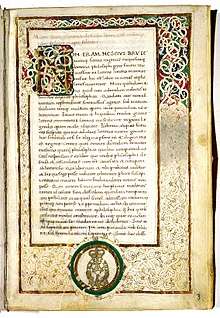De finibus bonorum et malorum
De finibus bonorum et malorum ("On the ends of good and evil") is a philosophical work by the Roman orator, politician and philosopher Marcus Tullius Cicero. It consists of five books, in which Cicero explains the philosophical views of Epicureanism, Stoicism, and the Platonism of Antiochus of Ascalon. The book was developed in the summer of the year 45 BC, and was written over the course of about one and a half months. Together with the Tusculanae Quaestiones written shortly afterwards, De finibus is the most extensive philosophical work of Cicero. It is dedicated to Marcus Junius Brutus.

In graphic design, Lorem ipsum, a commonly used placeholder text, is based on De finibus. The placeholder text is taken from parts of the first book's discourse on hedonism. Words of the original text have been altered, added, and removed in Lorem ipsum to make it nonsensical, improper Latin.
Contents
First and second books (Liber Primus and Liber Secundus)
In the first two books Cicero argues against Epicureanism. This happens in form of a fictitious discussion between two friends of Brutus on Cicero's estate at Cumae. In the first book the interlocutors present the theory of hedonism, with which pleasure in the form of the absence of pain is regarded as the highest good. In the second book Cicero criticizes this view, whereby he attacks the hedonistic definition of pleasure and argues that it is inconsistent to hold pleasure as absence of pain as the final good, since these are not one single good, but rather two distinct goods.
Third and fourth books (Liber Tertius and Liber Quartus)
In the next two books the Stoic school is discussed. In the third book Cicero's interlocutor Marcus Porcius Cato presents Stoic theory, whereby he introduces in Latin the technical terms used by the Stoics. The highest and only good of the Stoics is presented as a moral good (virtue). In his counterattack in the fourth book Cicero doubts the derivation of the Stoic view from a supposed natural state (the "cradle argument"), as well as the exclusion of other goods by these teachings.
Fifth book (Liber Quintus)
In the last book Cicero presents in the form of a dialogue between himself and several friends the theory of the Academics (of which, surprisingly with regard to their later relation, Aristotelianism is here considered a subgroup), chiefly as taught by Antiochus of Ascalon. This describes a perfectly happy life, which includes both virtue and external goods, as the highest good. At the end of the book, Cicero criticized logical inconsistencies of this teaching, but more briefly and only addressing details, not broader principles. Cicero then declares that he follows this school of thought, albeit not without reservations, while respecting the valuable aspects of the teachings presented in the previous books.
References
External links
| Latin Wikisource has original text related to this article: |
- De finibus bonorum et malorum, Latin text
- De Finibus, English translation by Harris Rackham, LacusCurtius
- Side by Side Latin and English, transl. by Harris Rackham, Google Books

